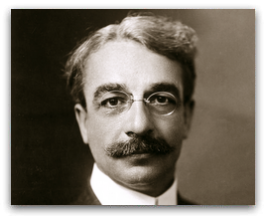Main menu
- ‘Abdu’l-Bahá’s Journey
- World Peace
- Stopping Racism in America
- Empowerment of Women
- More Principles...
- Prayer for America
Howard Colby Ives

Howard Colby Ives was born in Brooklyn in 1867. His youth was spent in New York state, with some time spent in Wyoming overcoming a lung difficulty. He graduated from a Unitarian theological school in Meadville, Pennsylvania in 1905, at the age of 38. He served as a Unitarian minister in Massachusetts, Connecticut, and New Jersey, building two small churches in the cities of New London, CT and Summit, NJ. Howard describes the 46 years of his life before 1912 as a period of “gestation” before the spiritual “birth” that then occurred.
In 1911, Howard had his first encounter with ‘Abdu’l-Bahá through an article in Everybody’s Magazine, and the following April he was among those waiting in New York. Irresistibly drawn to that magnetic personality, Howard met with ‘Abdu’l-Bahá many times over the course of several months, an experience which threw his spiritual life into tumult. Summarizing a particular experience in August 1912, he writes:At that time, about four months after my first meeting with Him, and seven months after first hearing of this worldwide movement, I was still, it seemed, almost as far away as ever from any true understanding of what it was all about. I was perpetually tossing in the turbulent Sea of Spirit: at brief moments caught in the up-thrust of that surging ocean of Truth, and for an instant dazzled by the Light of the Sun of Reality. But only for a moment; then dropped again into the trough of the sea and shut from that Light. Each time the illumination came I clung to it and said within my heart: “This time I will not let Thee go.” And each time, when the darkness closed around, my agonized heart averred: “The Light is gone forever. It was but a dream born of vain hopes.”
Howard’s experiences in 1912 eventually transformed him. He kept up a correspondence with ‘Abdu’l-Bahá after the latter’s departure from America, and in a few months became convinced of the truth of Bahá’u’lláh’s teachings, “a conviction which has never since wavered for an instant.” For many years after leaving the ministry, Howard worked odd jobs, often as an itinerant salesman, always with the goal of spreading the Faith.
In 1921 he and his wife Mabel sold everything and spent the next 20 years, until the end of his life, traveling throughout the US and Canada spreading the message he had come to love. They often gave self improvement courses, coupled with talks on the Bahá’í Faith, establishing and nurturing small Bahá’í groups along the eastern seaboard and into the south. Throughout his life Howard often referred to the effect of his time with ‘Abdu’l-Bahá, such as in this excerpt from a letter written by him in 1933:
“When the Master was here he told me with great emphasis: “This is a Day for Very Great Things.” Three times He repeated this, looking at me with such intentness and meaning. “Remember, Mr. Ives, what I say, this is a Day for Very GREAT Things.”These Words from those Blessed lips have rung in my heart ever since. Truly I am willing to pay any price for confirmation in true servitude.”
In 1936, in poor health and with failing eyesight, Howard wrote the book Portals to Freedom, an intimate account of his experiences with ‘Abdu’l-Bahá and his personal quest for faith. He passed away in Arkansas in June 1941.










